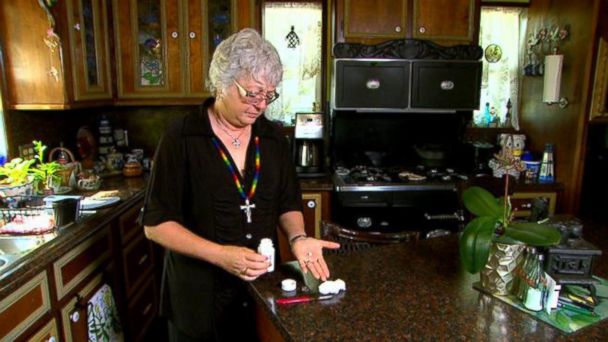Outrage at the Increasingly High Cost of Cancer Drugs
Cancer drug prices have doubled in the past decade, from an average of $5,000 per month to more than $10,000.
Eleven of the 12 cancer drugs the Food and Drug Administration approved for fighting cancer in 2012 were priced at more than $100,000 per year, double the average annual household income, according to a report by the Journal of National Cancer Institute.
RELATED: Doctors Excited by New Cancer Treatment
Patricia Thomson, a married, working mother whose leukemia is in remission, is one of the many cancer patients struggling to pay for her medication.
One of her prescriptions, Sprycel, is helping to keep her alive but it costs at least $106,000 a year. Even with Medicare payments, Thomson would have to pay about $10,000 a year out of pocket.

(Photo Credit: ABC News)
"I have 30 pills left," said Thomson, 65. "About seven weeks' worth."
If her pill bottle goes empty, she fears she will die, yet she can't afford the high payments. "It's like, 'Why is this happening?' and it just all seems so unfair," Thomson told ABC News.
Bristol-Myers Squibb, a global biopharmaceutical company, produces Sprycel.
Thousands of cancer patients, even many with insurance, face the same dire decision: Go bankrupt or die.
Dr. Hagop Kantarjian, chief of the Lukemia Center at the M.D. Anderson Cancer Center in Houston, is leading a protest by more than 100 cancer specialists demanding pharmaceutical companies lower their drug prices. "Patients who cannot afford the drugs are forgoing the treatment and dying," Kantarjian said.
Pharmaceutical companies say it costs on average more than $1 billion to research a new drug and bring it to market, but critics put the costs at less than $90 million.
"The pharmaceutical industry is the second most profitable industry in the United States, after the oil and gas industry," Kantarjian told ABC News.
Sprycel and other top-tier cancer drugs cost twice as much in the United States as they do in parts of Europe, China, Canada and the United Kingdom, where the government sets a limit on pricing.
As the cost of the pills has more than doubled since 2007, the CEOs earned tens of millions of dollars.
Thomson said she doesn't believe it's ethical for the pharmaceutical companies to charge so much for the drugs. "I don't know that you need a gazillion dollars' worth of profit," she said.
Bristol-Myers Squibb said in a statement to ABC News, "We take great care to price our medicines based on the cost to develop them, the scientific innovation they represent, and the value they deliver to patients and physicians. … For Sprycel, we have robust patient assistance programs in place."
READ Bristol-Myers Squibb full statement here.
Still, nearly one in five cancer patients can't afford their medication. Thomson applied to a reimbursement support program and she was denied.
She is now down to 30 pills and has little hope.